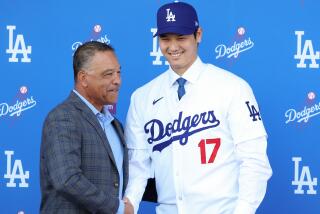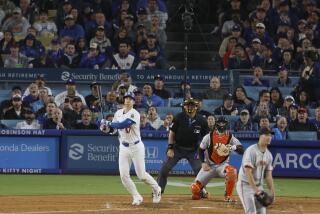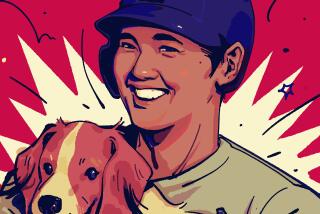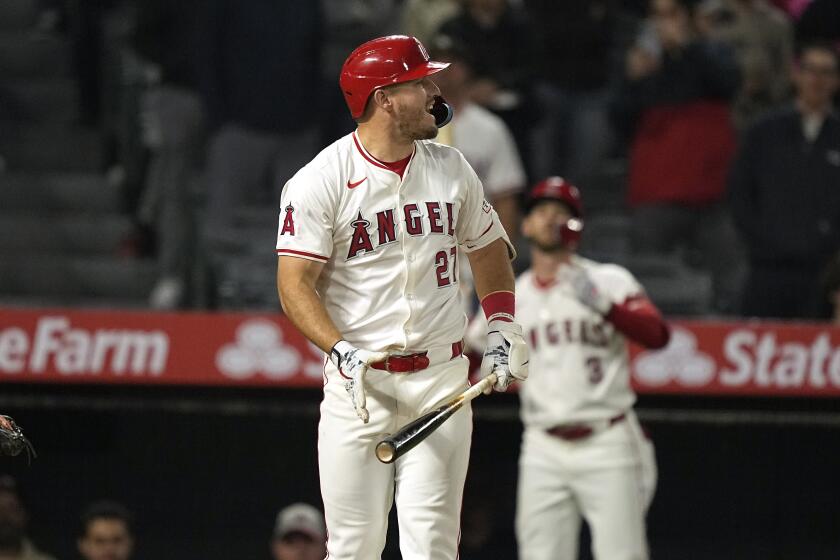He was the Angels’ first two-way player. Shohei Ohtani, meet Wonderful Willie Smith
Babe Ruth this, Shohei Ohtani that.
In grainy black-and-white video, and in the pinstripes of the most legendary team in sport, Ruth is the most famous player in baseball history. In high-definition red, and in a halo bright enough to eclipse Mike Trout, Ohtani is the most celebrated player on the planet today.
Ruth and Ohtani have been linked in breathless global hype, with Ohtani portrayed as the once-in-a-century revival of the two-way star. Ruth this, Ohtani that, and no one else must have done this since the Roaring ’20s.
Ruth is wonderful, Ohtani too. But the last man to do this in the major leagues had that adjective as his nickname, and he wore a halo too. The last man to pitch in 15 games and play 15 games in the field in the same season did so for the Angels, in 1964.
They called him Wonderful Willie Smith.
“There is nothing but joy that I remember from Willie Smith,” said Buck Rodgers, the Angels’ catcher in 1964.
Smith was born in 1939 in Anniston, Ala. He aspired to a career in boxing, but walked away after three broken noses. He played football in high school, but walked away after a broken arm.
Baseball would be his sport. He played for the Birmingham Black Barons of the Negro Leagues, starting at 18, as a pitcher, first baseman and outfielder. The Detroit Tigers signed him in 1960, let him pitch and hit in the minor leagues, then promoted him to the majors in 1963 and used him as a pitcher. On April 28, 1964, the Tigers traded him to the Angels.
“I remember he had a good swing,” Angels manager Bill Rigney told The Times. “But we didn’t get him for his bat.”
In his first month with the Angels, he pitched, primarily in relief. His earned-run average that month was 1.65.
“He probably had the best curveball on the team,” Rodgers said.
On June 8, Rigney deployed Smith just about every way he could. In the top of the seventh inning, with the Angels down 2-0 to the Cleveland Indians, Rigney used Smith as a pinch-hitter, and he singled home the Angels’ first run.
In the bottom of the seventh, Rigney sent Smith to right field. In the bottom of the eighth, with the score tied 3-3, with one out and one on, and with three consecutive left-handers due up, Rigney summoned the left-handed Smith to pitch.
Smith could not throw in the bullpen while he was playing right field, so he had only the allotted eight warm-up pitches from the mound. The first batter lined out. The next two hit home runs. The Angels lost.
On June 14, Smith started in left field and hit his first major league home run. On June 15, he made his last appearance that season as a pitcher. On June 16, he started in right field, batting cleanup.
The 1964 Angels ranked second in the American League in ERA, last in runs scored.
“We lacked a little bit in the scoring column, and Willie fit into that,” said Bobby Knoop, the Angels’ second baseman that season.
No sooner had Smith joined the starting lineup than the Angels reeled off an 11-game winning streak. He scored the winning run in the first game, doubled home the first run in the second game, singled home the first run in the third game, singled home the winning run in the sixth game, and hit game-winning home runs in the seventh and eighth games.
“The Dodgers and Giants have their Willie and so do the Angels!” wrote Braven Dyer in The Times.
The summer before, he was a little-used pitcher in Detroit. Now the local paper dared to mention him in the same sentence as Mays, McCovey and Davis.
“If I’ve been asleep,” Smith told The Times, “I don’t want to wake up.”
Smith finished that season with an ERA of 2.84 and a batting average of .301, with 11 home runs in 118 games. He batted .435 (10 for 23) as a pinch-hitter.
“The uniqueness of Smitty was that he was going to get the job done,” Knoop said. “If we brought him out of the bullpen to strike the guy out with the winning run at third base, he was going to do it. If he pinch-hit and we needed a home run, he was going to do it.”
That turned out to be the season of his life. Smith played two more years with the Angels, then bounced to the Cleveland Indians, Chicago Cubs, Cincinnati Reds and Japan’s Nankai Hawks.
He pitched three more times in the major leagues, all in 1968, in mop-up roles. He did not give up a run.
Rodgers later managed the Angels. He said he would have loved a player with Smith’s versatility and thought it might play even better now, when expanded bullpens force teams into three-man and four-man benches.
Did Rodgers consider Smith a better hitter or pitcher?
“He was major-league caliber in both,” Rodgers said, “but he was not outstanding in either.”
Major-league caliber is among the highest of compliments. Ask Rudy Abbott, who played youth ball with Smith and later coached 32 years — winning two NCAA Division II championships — at Jacksonville (Ala.) State.
“I never saw another Willie Smith, in all my years of coaching,” Abbott said. “Never saw one.”
When his playing days were done, Smith returned home to Anniston and never left. He played and coached semipro ball. He worked in construction, for a clay company and with local parks and recreation departments.
He did not talk much about his career, but he happily pitched in when one of Abbott’s players needed some pitching or hitting help.
“He was not what you would call a stuck-up major leaguer, full of himself,” Abbott said. “He was an everyday guy, like me and you. And he would help anybody.”
Smith is enshrined in the Calhoun County (Ala.) Sports Hall of Fame. Joe Estep, the president of its board of directors, remembered encountering Smith while playing in an industrial league softball game a couple of decades ago.
Estep pitched for one team. The pitcher for the other team looked to be about 60, and he had put on a few extra pounds. But when that pitcher came to bat, he whacked the heck out of the ball. Estep, stunned, wondered whether his teammates knew who the big guy was.
“You don’t know?” they asked. “That’s Willie Smith.”
The inscription on his grave marker, according to the Anniston Star: “Willie Smith, 1939-2006: He Is Just Away.”
Ohtani starts Sunday for the Angels — at pitcher — and Abbott might watch. He is 77 now.
He saw Ohtani on television last month against the New York Yankees, Ruth’s team. He shook his head in disbelief. The announcers kept talking about Ruth this, and Ohtani that, as if no one in between ever had hit and pitched.
“Willie Smith,” Abbott said, “did all that.”
Follow Bill Shaikin on Twitter @BillShaikin
More to Read
Go beyond the scoreboard
Get the latest on L.A.'s teams in the daily Sports Report newsletter.
You may occasionally receive promotional content from the Los Angeles Times.







